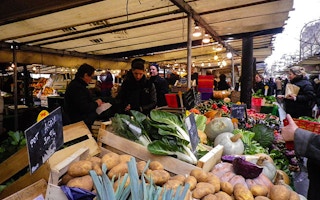US scientists who have examined the planetary food production menu recommend that, to save the planet, organic farming needs to be backed up by resolute action to persuade humans to skip the hamburgers and try the vegetarian option.
They also recommend that people who opt for the fish diet should choose the line-caught or seine-netted dishes. That is because the energy demand of dragging a trawl across the seabed imposes higher fuel costs and results in 2.8 times the release of greenhouse gases, compared with other fishery technologies.
And, they say, more “organic” methods of farming do not necessarily reduce the hazards of climate change. They checked the emissions from grain-fed versus grass-fed beef and came to an unexpected conclusion: grazing animals delivered more greenhouse emissions.
“
Although high agricultural efficiency consistently correlated with lower environmental impacts, the detailed picture we found was extremely mixed.
Michael Clark, ecologist, University of Minnesota
And they found that, while organic farming systems used less energy, they offered no real advantage in lower greenhouse gas emissions. That is because extensive rather than intensive farming demands more soil, with higher levels of taint and pollution in the rivers and lakes, per unit of food produced.
No revelation
None of this should be any great surprise. Agriculture must feed 7bn people, and to do this already emits somewhere between 25 per cent and 33 per cent of all greenhouse gases into the atmosphere, to drive global warming and put future food supplies at hazard. Agriculture exploits 40 per cent of the land, and accounts for 70 per cent of freshwater withdrawal.
By 2050 farmers will have to feed an estimated 9.7bn on the croplands and pastures available now, because to clear forests for more farms can only accelerate more dangerous climate change.
Researchers have repeatedly argued that a change in attitudes, a change in appetites and a change in farming approaches can save the world and keep the human race decently nourished. But it will require a new global strategy, and a big shift away from the meat diet.
The latest study comes from Michael Clark and David Tilman, two ecologists at the University of Minnesota. To study the connections between food, farming and environmental degradation, they tabled a smörgåsbordof dietary possibilities.
They report in Environmental Research Letters that they examined 740 different production systems for 90 different foods, to calculate levels of land use, greenhouse gas emissions (GHGs), fossil fuel energy use, the nutrient runoff that leads to eutrophication or “dead zones” in lakes and rivers, and the potential for acidification of the waters.
“Although high agricultural efficiency consistently correlated with lower environmental impacts, the detailed picture we found was extremely mixed”, Dr Clark said.
“While organic systems used less energy, they had higher land use, did not offer benefits in GHGs, and tended to have higher eutrophication and acidification potential per unit of food produced. Grass-fed beef, meanwhile, tended to require more land and emit more GHGs than grain-fed beef.
Ruminant impacts
“Interestingly, we also found that a shift away from ruminant meats like beef – which have impacts three to 10 times greater than other animal-based foods – towards nutritionally similar foods like pork, poultry or fish would have significant benefits, both for the environment and for human health.
“Larger dietary shifts, such as global adoption of low-meat or vegetarian diets, would offer even larger benefits to environmental sustainability and human health.”
And Professor Tilman said action – through education and policy shifts – was needed to persuade consumers to switch to healthy foods with a lower impact on the environment, while farmers changed to low-impact, high efficiency systems. Without such changes, agricultural expansion could cause substantial and irreversible environmental damage.
“A lack of action would result in massive increases in agriculture’s environmental impacts including the clearing of 200 to 1,000 million hectares of land for agricultural use, an approximately three-fold increase in fertiliser and pesticide applications, an 80 per cent increase in agricultural GHG emissions and a rapid rise in the prevalence of diet-related diseases such as obesity and diabetes.”
This story was published with permission from Climate News Network.










